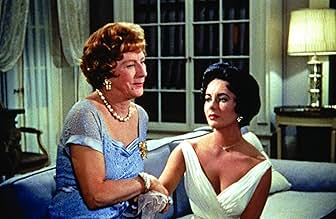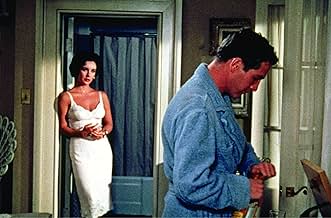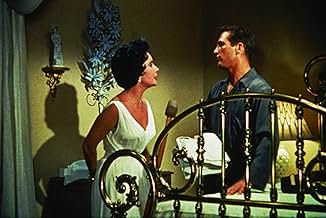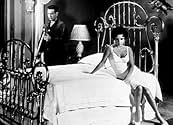Brick is an alcoholic ex-football player who drinks his days away and resists the affections of his wife. A reunion with his terminally ill father jogs a host of memories and revelations for... Read allBrick is an alcoholic ex-football player who drinks his days away and resists the affections of his wife. A reunion with his terminally ill father jogs a host of memories and revelations for both father and son.Brick is an alcoholic ex-football player who drinks his days away and resists the affections of his wife. A reunion with his terminally ill father jogs a host of memories and revelations for both father and son.
- Director
- Writers
- Stars
- Nominated for 6 Oscars
- 3 wins & 16 nominations total
Zelda Cleaver
- Sookey
- (uncredited)
Brian Corcoran
- Boy
- (uncredited)
Hugh Corcoran
- Buster
- (uncredited)
Kevin Corcoran
- Child
- (uncredited)
Patty Ann Gerrity
- Dixie
- (uncredited)
Bobby Johnson
- Pollitt Groom
- (uncredited)
Walter Merrill
- Party Guest
- (uncredited)
Deborah Miller
- Trixie
- (uncredited)
Robert 'Rusty' Stevens
- Sonny
- (uncredited)
Vince Townsend Jr.
- Lacey
- (uncredited)
- Director
- Writers
- All cast & crew
- Production, box office & more at IMDbPro
7.956.2K
1
2
3
4
5
6
7
8
9
10
Featured reviews
One Of The Best Newman Films
I've got to say that Tennessee Williams' 'Cat On A Hot Tin Roof' was one of the best Newman films. It's one of those movies that grabs your attention in the first 10 minutes. The interactions between the gifted actors and actresses were stupendous. I really felt for Maggie (Elizabeth Taylor) "The Cat ", though and how she was able to keep her composure with her husband Brick Pollitt's (Paul Newman) berating of her. We learn that he was a drunk trying to recapture his glory days of high school sports by leaping hurdles on a track field, dreaming about his moments as a youthful athlete, but suddenly he falls and breaks his leg, leaving him dependent on a crutch. During the film, he has some harsh words for Maggie. I felt that her character was treated unfairly by Brick and to make matters worse, his father Big Daddy (Burl Ives), shows nothing, but contempt for his son that he's even violent towards him. I really understood why he was so angry with Brick and as you watch the verbal fight between the two, you really side with Big Daddy. Newman really was a great actor and was the best choice for this part. Taylor, on the other hand, is a big star And she played Maggie to a T! I really think the Hollywood scripts these days are dead weight compared to the 50s and 60s! The exchanges of dialog and the acting were definitely marvelous. Canadian actress Madeleine Sherwood, who played Mae Pollitt in the film, was the last one to pass away in 2016 at 93! they all left their mark in the acting world.
Not for Williams purists but a great film
Much has been made of the differences between Tennessee Williams' play and this film--the homoerotic themes have been driven further into subtext (though not eliminated entirely) and a more upbeat ending was added. The changes were necessary when the film was made; although theater and literary purists decry the "sanitizing" or censorship of plays when they are adapted for the screen, in some cases (such as this one) the changes can improve the work in question. "Cat" on film is clearer, for one thing. Tennessee Williams plays tend to be "cluttered" in their original form. They are also cynically downbeat; if that type of story appeals to one, this adaptation might be off-putting.
As with all theatrical adaptations, many of the scenes are excessively talky, especially the Brick/Big Daddy scenes in the second act. Some of the highlights are just as wordy but thoroughly enjoyable rather than tedious (especially Maggie's story about Mae's reign as Cotton Carnival Queen and the entire scene in the basement). All of the performances are excellent, though Paul Newman as Brick is less flashy; it's not really until the basement scene that one feels his talent is given a workout. Elizabeth Taylor is an emotional rollercoaster, venturing from flirtatious to hectoring to wheedling to calm to grasping to tender, often within a single scene, and yet she never slips the rails. Watching films from this period (her career peak), one wonders what happened to turn her into the vague, bleary-eyed woman we see today. Judith Anderson's Big Mama is loud, coarse, and bossy, but completely sympathetic both in the scene with the birthday cake and in the confrontation scene at the end. When Big Daddy invites her along with him at the end, it is every bit as welcome to the viewer as it is to her. Burl Ives is the most towering of all; the emotional growth in the film is as much his as it is Brick's. Jack Carson and Madeleine Sherwood are every bit as good despite being relegated to comic relief at times.
My favorite aspect of this story, however, is the social dynamic. Brick and Maggie are spoiled, young, "beautiful people" who have yet to take on any responsibility, while Gooper and Mae are the epitome of a serious young family. Brick is an alcoholic former football player, while Gooper is a corporate lawyer. Despite these obvious differences, however, both their parents and the audience (and Tennessee Williams, obviously) clearly prefer Brick and Maggie. Every aspect of Gooper and Mae's personalities, even those which bespeak traditional values, are portrayed as petty and unimaginative. Even if one believes that Gooper and Mae have done all the right things, they have done them for the wrong reasons. Thus the theme of the story is most clearly presented: all that is important is to love and to express that love.
As with all theatrical adaptations, many of the scenes are excessively talky, especially the Brick/Big Daddy scenes in the second act. Some of the highlights are just as wordy but thoroughly enjoyable rather than tedious (especially Maggie's story about Mae's reign as Cotton Carnival Queen and the entire scene in the basement). All of the performances are excellent, though Paul Newman as Brick is less flashy; it's not really until the basement scene that one feels his talent is given a workout. Elizabeth Taylor is an emotional rollercoaster, venturing from flirtatious to hectoring to wheedling to calm to grasping to tender, often within a single scene, and yet she never slips the rails. Watching films from this period (her career peak), one wonders what happened to turn her into the vague, bleary-eyed woman we see today. Judith Anderson's Big Mama is loud, coarse, and bossy, but completely sympathetic both in the scene with the birthday cake and in the confrontation scene at the end. When Big Daddy invites her along with him at the end, it is every bit as welcome to the viewer as it is to her. Burl Ives is the most towering of all; the emotional growth in the film is as much his as it is Brick's. Jack Carson and Madeleine Sherwood are every bit as good despite being relegated to comic relief at times.
My favorite aspect of this story, however, is the social dynamic. Brick and Maggie are spoiled, young, "beautiful people" who have yet to take on any responsibility, while Gooper and Mae are the epitome of a serious young family. Brick is an alcoholic former football player, while Gooper is a corporate lawyer. Despite these obvious differences, however, both their parents and the audience (and Tennessee Williams, obviously) clearly prefer Brick and Maggie. Every aspect of Gooper and Mae's personalities, even those which bespeak traditional values, are portrayed as petty and unimaginative. Even if one believes that Gooper and Mae have done all the right things, they have done them for the wrong reasons. Thus the theme of the story is most clearly presented: all that is important is to love and to express that love.
Scolding, Intense & Powerful...
There are tensions that have built between a couple, Brick Pollitt shows contempt, it's far from subtle, his wife Maggie's in despair, she's in love and really cares, but it's fair to say this pairing, is in trouble. Big Daddy joins the party for his birthday, but the whiskey being drunk just goes down one way, secrets hidden and withheld, relationships are hewn and felled, wounds reopened, from a friend, lost through betray. At the climax of this film you'll hold your breath, as the family is overwhelmed, distressed, with performances profound, so much lost and so much found, you will not be disappointed, I attest.
Three of the greatest cinematic performances placed on film.
Three of the greatest cinematic performances placed on film.
Elizabeth Taylor, RIP
Elizabeth Taylor's death a few days ago prompted me to watch one of her most famous movies.* I've never seen a stage production of Tennessee Williams's "Cat on a Hot Tin Roof", but I will say that the movie version is worth seeing, despite the unrealistic southern accents. The storm taking place outside the mansion is nothing compared to the tension between all the family members gathering for the patriarch's birthday.
As with another notable Tennessee Williams play -- "A Streetcar Named Desire" -- they had to remove the references to homosexuality to bring the movie to the silver screen. Still, the scenes of Maggie (Taylor) in her slip seem as though they would have been risqué for the time. Along with her, just about every character made me feel as if my throat was going to constrict. In a way, it's as if the only truly benign characters were the servants.
All in all, I wouldn't call this movie a supreme masterpiece, but I found it to be worth seeing. This one, along with "Streetcar" and "Baby Doll" are the three great adaptations of Tennessee Williams plays. Also starring Paul Newman, Burl Ives, Judith Anderson (Mrs. Danvers in "Rebecca"), Jack Carson and Madeleine Sherwood (Reverend Mother on "The Flying Nun").
*This is going to sound insane, but prior to "COAHTR", the only movie in which I'd seen Elizabeth Taylor was the god-awful "Flintstones" movie, in which she played Wilma's mother.
As with another notable Tennessee Williams play -- "A Streetcar Named Desire" -- they had to remove the references to homosexuality to bring the movie to the silver screen. Still, the scenes of Maggie (Taylor) in her slip seem as though they would have been risqué for the time. Along with her, just about every character made me feel as if my throat was going to constrict. In a way, it's as if the only truly benign characters were the servants.
All in all, I wouldn't call this movie a supreme masterpiece, but I found it to be worth seeing. This one, along with "Streetcar" and "Baby Doll" are the three great adaptations of Tennessee Williams plays. Also starring Paul Newman, Burl Ives, Judith Anderson (Mrs. Danvers in "Rebecca"), Jack Carson and Madeleine Sherwood (Reverend Mother on "The Flying Nun").
*This is going to sound insane, but prior to "COAHTR", the only movie in which I'd seen Elizabeth Taylor was the god-awful "Flintstones" movie, in which she played Wilma's mother.
Wonderful Williams - Brilliant Ives
Burl Ives gives the greatest portrayal of a literary character in film history, and he wasn't even recognized by an Oscar nomination, further evidence of the Academy's complete lack of credibility as an arbiter of screen excellence.
The casting is brilliant:
Tennessee Williams's Big Daddy was indeed big - larger than life, domineering, insensitive, self-absorbed. Burl Ives's Big Daddy is larger than life, insensitive, domineering, self-absorbed. Ives is "on" every moment. And every moment is true.
Paul Newman's Brick, is as afraid of life as Big Daddy is in love with it. Yet, in his way, he's a chip off the old block - self-absorbed, insensitive.
And domineering or, as Big Daddy and Maggie would have it, masterful, ready to take charge -
if he could just get over himself.
I confess, I don't care for Elizabeth Taylor as an actress, but she is so right for the part, that I can't think of anyone else to fill it. Anyway, who else has eyes that could compete with Newman's?
Judith Anderson plays the typical Williams matron, living in her house of delusions. She's Big Daddy's tormented, desperately lonely, unloved partner, who towards the end wins Big Daddy with her nobility and devotion.
The under-appreciated Jack Carter has the unenviable role of Brick's pliant, conformist brother, Gooper, decent at heart but worn out after years of jumping through Big Daddy's hoops and still winding up on the short end, with a house full of brats, bred at Big Daddy's presumed bidding and delivered by a scheming, ambitious weasel of a wife. Gooper the only character I have a little trouble with, because his climactic speech, as rendered by Carter, is so heartfelt, that we are aggrieved with him at the injustice of Big Daddy's favoritism for the no-account but aesthetically more pleasing Brick.
Perhaps an even more unenviable role is that of Gooper's wife, played to perfection by Madeleine Sherwood. Anyone who has grown up in the South has known "Sister Woman". I can assure those who haven't, that this character is not a stereotype or caricature.
There are a few quibbles. One character, the family doctor, though played well by Larry Gates, has a dramatic function that's about as useful as the referee in a pro wrestling match, but not nearly as decorative. I guess he's included to provide plot information, but I think it could have been provided just as well without him. I was also put off by the contrived thunder claps at dramatic moments. Then, there were some continuity problems, such as different facial expression when shot angles were changed and Gooper's too many "Shut ups" to Sister Woman.
If, as another reviewer has said, Tennessee Williams hated this film, then it couldn't have been because it was untrue to his work. If he disliked the changes and omissions, he should blame '50s prudishness, not the film, for dictating, say, the suppression of Brick's homosexuality.
Williams wrote about lies and delusions, the good ones and bad ones. Well, that's what Cat on a Hot Tin Roof and Streetcar Named Desire and Glass Menagerie were all about. Tennessee Williams's stories about the South and its culture of delusion are not just rebukes of Southern hypocrisy and bloodymindedness but paeans to the gentle and genteel refuge which delusion provides. As Maggie "The Cat" says, "Truth, truth - everybody keeps hollerin' about the truth. Well, the truth is as dirty as lies."
Finally, I think it was brilliant of Richard Brooks to insist on color, for Williams's stuff is talky, and with the drabness of a typical Williams set, this can be a bit oppressive. With color, and the wonderful animation Brooks instills in all the characters, his Cat contains not a dull moment. If Brooks has given us something at odds with what Williams intended, I think he has given us something just as fine.
The casting is brilliant:
Tennessee Williams's Big Daddy was indeed big - larger than life, domineering, insensitive, self-absorbed. Burl Ives's Big Daddy is larger than life, insensitive, domineering, self-absorbed. Ives is "on" every moment. And every moment is true.
Paul Newman's Brick, is as afraid of life as Big Daddy is in love with it. Yet, in his way, he's a chip off the old block - self-absorbed, insensitive.
And domineering or, as Big Daddy and Maggie would have it, masterful, ready to take charge -
if he could just get over himself.
I confess, I don't care for Elizabeth Taylor as an actress, but she is so right for the part, that I can't think of anyone else to fill it. Anyway, who else has eyes that could compete with Newman's?
Judith Anderson plays the typical Williams matron, living in her house of delusions. She's Big Daddy's tormented, desperately lonely, unloved partner, who towards the end wins Big Daddy with her nobility and devotion.
The under-appreciated Jack Carter has the unenviable role of Brick's pliant, conformist brother, Gooper, decent at heart but worn out after years of jumping through Big Daddy's hoops and still winding up on the short end, with a house full of brats, bred at Big Daddy's presumed bidding and delivered by a scheming, ambitious weasel of a wife. Gooper the only character I have a little trouble with, because his climactic speech, as rendered by Carter, is so heartfelt, that we are aggrieved with him at the injustice of Big Daddy's favoritism for the no-account but aesthetically more pleasing Brick.
Perhaps an even more unenviable role is that of Gooper's wife, played to perfection by Madeleine Sherwood. Anyone who has grown up in the South has known "Sister Woman". I can assure those who haven't, that this character is not a stereotype or caricature.
There are a few quibbles. One character, the family doctor, though played well by Larry Gates, has a dramatic function that's about as useful as the referee in a pro wrestling match, but not nearly as decorative. I guess he's included to provide plot information, but I think it could have been provided just as well without him. I was also put off by the contrived thunder claps at dramatic moments. Then, there were some continuity problems, such as different facial expression when shot angles were changed and Gooper's too many "Shut ups" to Sister Woman.
If, as another reviewer has said, Tennessee Williams hated this film, then it couldn't have been because it was untrue to his work. If he disliked the changes and omissions, he should blame '50s prudishness, not the film, for dictating, say, the suppression of Brick's homosexuality.
Williams wrote about lies and delusions, the good ones and bad ones. Well, that's what Cat on a Hot Tin Roof and Streetcar Named Desire and Glass Menagerie were all about. Tennessee Williams's stories about the South and its culture of delusion are not just rebukes of Southern hypocrisy and bloodymindedness but paeans to the gentle and genteel refuge which delusion provides. As Maggie "The Cat" says, "Truth, truth - everybody keeps hollerin' about the truth. Well, the truth is as dirty as lies."
Finally, I think it was brilliant of Richard Brooks to insist on color, for Williams's stuff is talky, and with the drabness of a typical Williams set, this can be a bit oppressive. With color, and the wonderful animation Brooks instills in all the characters, his Cat contains not a dull moment. If Brooks has given us something at odds with what Williams intended, I think he has given us something just as fine.
Did you know
- TriviaDespite being really affected by her husband Mike Todd's death, Elizabeth Taylor resumed her job in a very professional way, without any delay on the set. Everyone was astonished by her determination.
- GoofsAfter Brick tries to drive away and gets stuck, Maggie goes out to him and helps him into the house through the pouring rain. Her hair is soaking wet, but the next time she is seen, it's perfectly dry and styled.
- Quotes
Harvey 'Big Daddy' Pollitt: I've got the guts to die. What I want to know is, have you got the guts to live?
- ConnectionsEdited into Hollywood: The Dream Factory (1972)
Details
- Release date
- Country of origin
- Language
- Also known as
- Un gato sobre el tejado caliente
- Filming locations
- Metro-Goldwyn-Mayer Studios - 10202 W. Washington Blvd., Culver City, California, USA(studio: made in Hollywood, U.S.A. by)
- Production company
- See more company credits at IMDbPro
Box office
- Budget
- $3,000,000 (estimated)
- Gross worldwide
- $1,872
- Runtime
- 1h 48m(108 min)
- Color
- Aspect ratio
- 1.85 : 1
Contribute to this page
Suggest an edit or add missing content


































